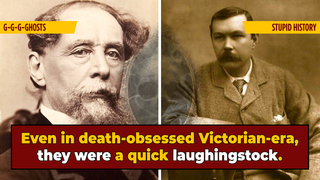That Time The 'Sherlock Holmes' And 'Christmas Carol' Writers Became Ghost Hunters

Based on the book in which he invented Christmas, you can probably guess that Charles Dickens was pretty into ghosts. He even believed that he himself had "magnetic powers" that he used to cure friends of hauntings, but when it came to everyone else, he was pretty fond of proof. Dickens also felt bad that his fictional ghost stories had boosted interest in spiritualism to the point of flooding the market with phony mediums. Meanwhile, Sir Arthur Conan Doyle, despite the devotion to logic of his most famous character, was so enamored with the idea of the supernatural that he insisted Harry Houdini had magic powers no matter how many times Houdini tried to correct him.

Together, this unlikely duo formed the ragtag team of Victorian ghost hunters they called the Ghost Club to investigate claims of paranormal activity. Okay, Dickens actually founded it in 1862, and Doyle came on board shortly thereafter, but that's not as good of a movie. They actually garnered some acclaim after one of their first and most famous investigations of the "Davenport spirit cabinet," which they proved rather conclusively was the product of clever engineering rather than ghosts, but even in death-obsessed Victorian England, they were pretty much immediately a laughingstock.
Don't Miss
Frustrated with the bad press, Dickens left in 1870, which opened the floodgates for his more credulous companions to go full History Channel. The next year, Ghost Clubber and supposedly renowned scientist Sir William Crookes claimed that he'd discovered the unquestionable physical existence of a "psychic force" that explained why mediums could contact the dead, and the Ghost Club never lived it down. They disbanded for a little more than a decade, but the Ghost Club was revived (get it?) by famed spiritualist William Stainton Moses, who believed, among other things, in the sort of "spirit photography" that would lead Sir Doyle to disgrace in 1920 when some little girls showed him pictures they'd taken of fairies and he was like "Yep, seems legit."

By the time Yeats joined, the Ghost Club had become little more than a supper club where high society got together to get drunk and pat themselves on the back for being so open-minded. They became much more secretive after the whole country started making fun of them, so it's not totally clear what went on, but during this time, Yeats took an interest in "automatic writing" and conducted experiments with his wife that required her to "scrawl down the words of invisible messengers," although weirdly, they always seemed to be about "the husband's duty to give his wife sexual satisfaction." (No, really.) The Ghost Club still exists today, but they mostly meet up in old pubs to hear lectures from guys positing "What if ghosts?" Leave it to the British to turn something as cool as ghost hunting into a TED Talk.
Top image: Wiki Commons, Pixabay